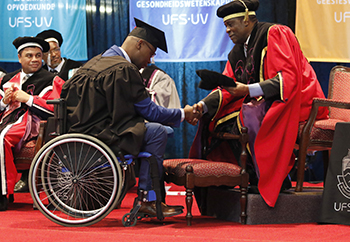Latest News Archive
Please select Category, Year, and then Month to display items
04 April 2024
|
Story Lunga Luthuli
|
Photo SUPPLIED
 Dr Juliet Kamwendo champions gender-inclusive climate action in Africa. Her expertise at the recently held AFR100 workshop highlighted vital steps towards sustainable and equitable development.
Dr Juliet Kamwendo champions gender-inclusive climate action in Africa. Her expertise at the recently held AFR100 workshop highlighted vital steps towards sustainable and equitable development.
Dr Juliet Kamwendo, Lecturer and Programme Director for Gender Studies in the Centre for Gender and Africa Studies at the University of the Free State, is spearheading efforts to integrate gender considerations into Africa's climate restoration agenda. Reflecting on her involvement, Dr Kamwendo stated, "This is particularly crucial, as women make up almost 50% of the population in Africa, and the depletion and degradation of land affect them disproportionately."
She recently served as a gender expert at the AUDA-NEPAD AFR100 workshop in Ouagadougou, Burkina Faso, from 25 to 29 March 2024. This initiative aims to restore forests and degraded land across Africa by 2030, with a focus on gender equality.
The workshop emphasised the integration of gender perspectives into the AFR100 project, acknowledging the disproportionate impact of land degradation on women. Dr Kamwendo's expertise highlighted the need to empower women in climate change interventions, addressing existing gender inequalities exacerbated by environmental degradation.
“Women – who are primarily responsible for household food security and water provision – bear the brunt of environmental degradation, leading to increased workloads, reduced income opportunities, and heightened vulnerability to climate-related disasters. Furthermore, the loss of forest cover and biodiversity further exacerbates the challenges faced by women, particularly in rural areas where they depend heavily on natural resources for their livelihoods,” added Dr Kamwendo.
Her participation highlights academia's crucial role in fostering inclusive and sustainable development, emphasising interdisciplinary collaboration to tackle complex environmental challenges. Through initiatives such as AFR100, stakeholders are working towards a more resilient and gender-responsive future for Africa.
Largest number of CUADS graduates at UFS
2017-07-03

During the mid-year graduation ceremonies at the
University of the Free State (UFS), the Centre for
Universal Access and Disability Support (CUADS) saw
the largest number of students with disabilities graduating.
Photo: Johan Roux
During the mid-year graduation ceremonies at the University of the Free State (UFS), the Centre for Universal Access and Disability Support (CUADS) saw the largest number of students with disabilities graduating.
For the first time since being established in February 2001, a total number of 30 students graduated, of which seven were postgraduate students.
Accomplishing your dreams as a student
Martie Miranda, Head of CUADS, says that one cannot help but become emotional with joy and happiness. “The feeling of satisfaction we feel with the graduates is so valuable, because it’s a reminder of their abilities to accomplish their dreams just like any other student.”
CUADS aims to ensure that the UFS creates opportunities for students with disabilities, aiming to become a higher-education institution recognised for its efforts in human reconciliation. Together with the Exam Division, CUADS coordinates alternative assessment with an accessible test and examination facility housed at CUADS. This accommodates students with concessions, amanuensis, specialised equipment, and accessible formatted papers.
Changing the challenges you experience
Miranda continuously encourages students to keep going. “If being successful is important to you, you will find a way to change the challenges you experience into opportunities. Either to learn something about yourself or teach someone else something.”
Below are the number of graduates from each faculty:
• Faculty of Law: 2
• Faculty of Economics and Management Sciences: 4
• Faculty of Education: 4
• Faculty of Natural and Agricultural Science: 9
• Faculty of the Humanities: 11